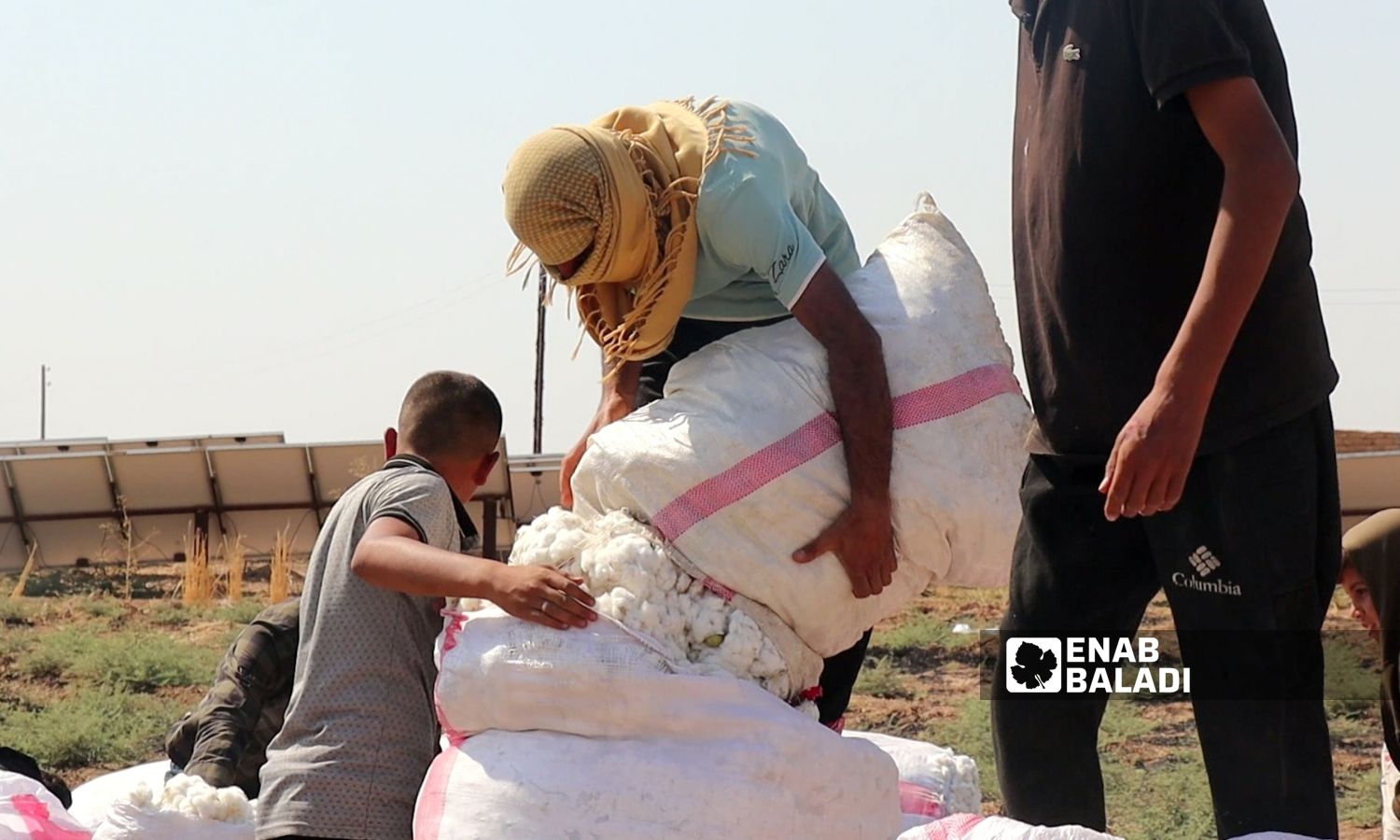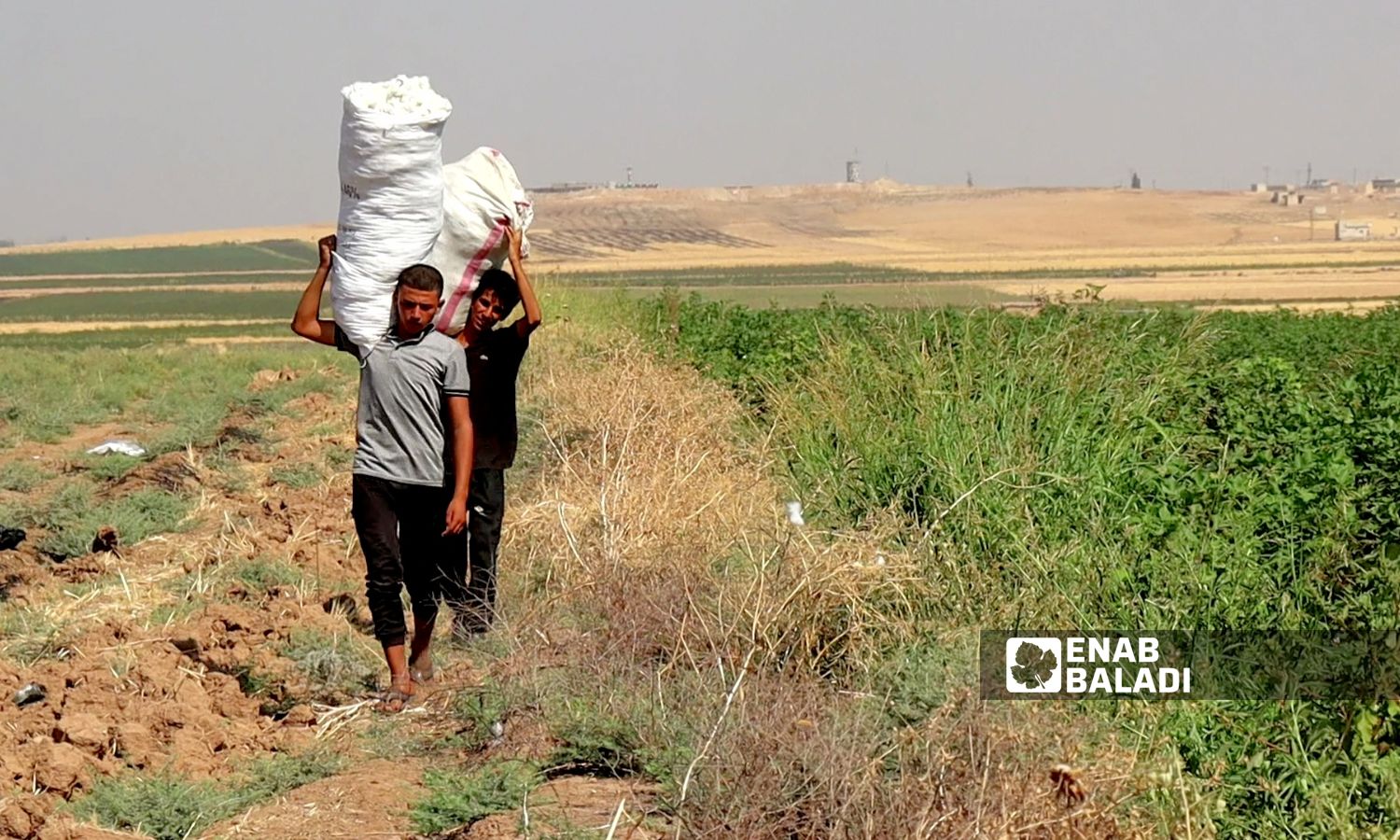



Ras al-Ain – Hussein Shaabo
Cotton farmers in the Ras al-Ain border region with Turkey, northeastern Syria, face merchants’ greed who buy their crop at low prices that do not cover production costs, while the opposition’s Syrian Interim Government (SIG) does not intervene to buy it.
The region’s farmers are exposed to major losses, especially with the decline in purchasing prices, as the price of a ton ranges between $500 and $550, while last year, its price ranged between $750 and $800.
Mohammad Ahmed planted cotton this year on an area of 50 dunams in Ras al-Ain, and its production reached 25 tons, but the current purchase price is not at all commensurate with the costs, as the cost of growing one dunam of cotton is $70, he told Enab Baladi. (Dunam = 900 m2)
Ahmed added that merchants are the ones who control the purchase price, refuse to buy cotton at prices higher than $550 per ton, and threaten farmers not to buy their crop if they do not agree to the prices offered.
Abd al-Razzaq Hussein, also a cotton farmer in Ras al-Ain, described the purchase price as “disastrous” for the farmers.
He told Enab Baladi that the price is low and not commensurate with the costs despite the good production this year, as he planted 100 dunams of cotton and harvested 40 tons.
Farmers interviewed by Enab Baladi explained that the Interim Government did not take any measures to protect the rights of farmers or provide support to them, did not adhere to its responsibilities towards them, and did not intervene to buy the crop.
Hussein recalled the wheat season three months ago, which the SIG no longer purchases, leaving farmers “victims” of merchants.

The prices of purchasing cotton are not commensurate with the costs of growing it in the border Ras al-Ain region, northwest of al-Hasakah – September 28, 2023 (Enab Baladi/Hussein Shaabo)
Sultan al-Ayed, a cotton merchant in Ras al-Ain, said that the decline in the international price of cotton and its low prices during the past and current year, and the geographical narrowness of Ras al-Ain, are among the reasons for the accumulation of last year’s crop at this time, and the low current purchase price.
Al-Ayed stated that the high cost of exporting cotton from Ras al-Ain is an obstacle for merchants, pointing out that merchants are forced to buy cotton at low prices.
The head of the Agriculture Office in the Ras al-Ain Local Council, Omar Hammoud, told Enab Baladi that the area of cotton cultivation for this year amounted to 65,000 dunams, pointing out that the decline in the international price of ginned cotton during the previous two years led to a decline in its prices locally, which will affect the decline in cotton cultivation in the future.
Hammoud stated that these reasons force farmers to convert their lands to rain-fed agriculture to save costs, which leads to the loss of the important summer season, which includes crops such as cotton, corn, and vegetables.
As a responsible party (the local council), Hammoud called on the Interim Government to provide subsidies to farmers to mitigate the losses they incurred in this year’s wheat and cotton seasons.
Al-Hasakah governorate leads cotton production in Syria, followed by the Raqqa and Deir Ezzor governorates, but in recent years, these governorates have witnessed a significant decline in cotton production due to security conditions, farmers’ instability, and the difficulty of disposing of the crop.
Other reasons include the migration of farmers, the high prices of seeds and pesticides, and the lack of water available for irrigation.
Cotton is one of the strategic crops on which the Syrian economy depends heavily, but it has become one of the crops threatened with unsustainability.
The Kurdish-led Autonomous Administration of North and East Syria (AANES) recently set the price of one ton of cotton at $800 (11,320,000 SYP) in the areas under its control without announcing the purchase of the crop from farmers while allowing it to be exported outside those lands.
The regime’s government set the price of purchasing cotton from farmers for the current season at 10,000 Syrian pounds per kilo (about 75 USD cents), and the price includes the transportation fee to the ginning place and the receiving centers of the General Organization for Cotton Ginning and Marketing.
The Interim Government did not announce its desire to buy the crop, nor did the Salvation Government operating in Idlib determine its purchase price from farmers until the moment of preparing this report.
In a previous interview with Enab Baladi, political economy researcher Dr. Yahya al-Sayyed Omar said that the decline of strategic agriculture in Syria has a severe negative impact, as agriculture is one of the most important economic activities in the country, and it used to contribute more than 25% of the state’s gross domestic product, absorbing 35% of workers.
Al-Sayyed Omar added that the decline in agriculture affects macro and micro-economic indicators, and this has contributed to the high rate of poverty, unemployment, low level of income, and, most importantly, the high threat of famine and food insecurity.
if you think the article contain wrong information or you have additional details Send Correction